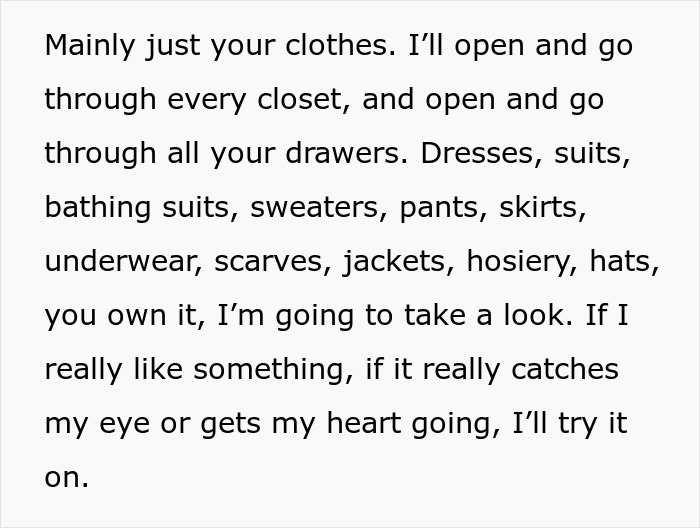How would you feel if you found out that your “trusted” house sitter had been snooping around in your stuff while you were away? Personally, I wouldn’t feel comfortable at all. Especially if it emerged that they’d gone through my closet, my bedroom or any of my very personal belongings. If you blindly trust just anyone to look after your pets or home, you might want to pay attention to this story…
A guy recently posted a confession on Reddit, detailing how he house sits for people purely for the pleasure of not only going through their things, but also trying on their clothing. The man admitted that he’s particularly into wearing the sexy outfits stashed in closets of married women. The house sitter said he wasn’t looking for advice, but that didn’t stop netizens from telling him exactly what they thought.
When he was younger, he’d sneak into his friends’ moms’ closets and try on their clothing

Image credits: Trần Long / Pexels (not the actual photo)
Now he house sits for strangers so he can secretly slip on their outfits without worrying about getting caught





Image credits: Mesut çiçen / Unsplash (not the actual photo)



Image credits: anonymous

Image credits: Lia Bekyan / Unsplash (not the actual photo)
Experts explain when cross-dressing can become a problem…
The Australia-based Gender Centre defines “cross-dressing” as ”wearing clothing and other effects commonly associated with a different gender than the one assigned at birth.” People have been doing it for centuries, and for various reasons. Sometimes it’s for self-expression, other times it’s about sexual expression. And then there are those who do it for comfort, fashion or entertainment.
Many cross-dressers begin doing so during childhood. “They have no idea why they feel the way they do, yet they often find that the expression of this part of their nature results in reprimand and alienation from parents, family and friends – the people they love and value the most,” reads the Gender Centre site. “This can result in the development of unreasonable feelings of unhealthy personal shame. So a lot of cross-dressers become secretive about their cross-dressing and do their best to suppress or deny this essential part of their being.”
Psychologists refer to this overwhelming sense of guilt and shame from cross-dressing as transvestic disorder. The Psychology Today site notes that most people who cross-dress do not fit into the diagnostic standards of transvestic disorder.
Rather, the disorder occurs when someone experiences recurrent, intense arousal from cross-dressing, and their urge to do so causes significant distress or impairment to their daily life. Symptoms of transvestic disorder include shame, guilt, and anxiety. The site adds that while it’s mostly men who are diagnosed with transvestic disorder, it’s a rare diagnosis.
The Gender Centre adds that just because someone cross-dresses does not mean they aren’t happy with the sex that they were assigned at birth: meaning they have no desire, nor any innate need to undergo any medical or surgical intervention to alter this, elaborates that site.
UK-based therapist Paul Parkin has done extensive research on cross-dressing, and it’s one of the fields he specializes in with his clients. The expert says, in most cases, cross-dressing is linked to attachment. That’s the emotional relationship between a young child and their parents.
“Most men who start cross-dressing at an early age have some kind of need for a closer connection, the initial wearing of feminine clothing is often linked to their connection or lack of connection in their early years,” writes Parkin on his website.
He adds that when boys do this, it’s much like some children who need a comfort blanket, or favorite soft toy. Comfort plays a very big part in cross-dressing, he says.
Transvestic disorder shouldn’t be confused with transvestism. The latter is simply a clinical (albeit outdated) term for cross-dressing, explains Psychology Today. “Cross-dressing in and of itself is not a disorder, so it does not require treatment,” notes the site. “Those with transvestic disorder typically work with a therapist to understand their urges, the pressures society places on them, and work to lessen the symptoms of shame and guilt.”
Someone seeking treatment for transvestic disorder is considered to be “in remission” when their desire to cross-dress has not caused them distress or impaired their daily life in at least five years.
Many people were disturbed by the guy’s confession and felt he was violating his clients’ privacy






























